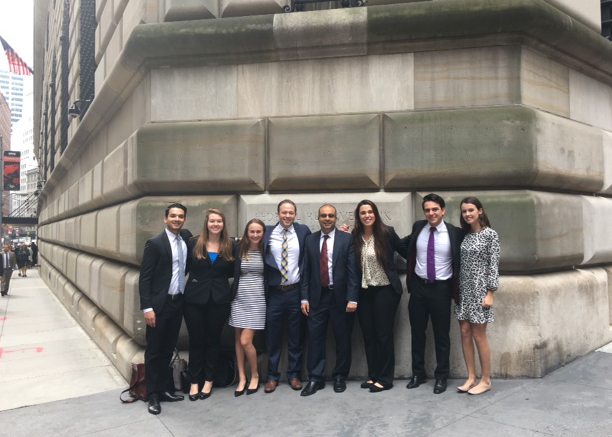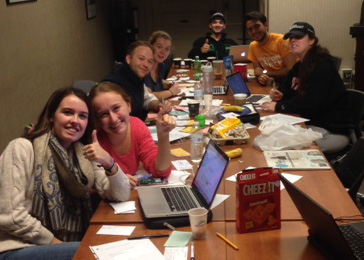Student competitions: they’re a great way to gain experience, boost the résumé and make friends, but are they life changing?
Certainly, with the right person at the helm.
 The College Fed Challenge is the Everest of national academic competitions, asking students to analyze the current state of the U.S. economy and make a recommendation for future monetary policy actions to a panel of judges who work at the Federal Reserve Bank. For six years running, Hany Guirguis, Ph.D., professor and chair of economics and finance, has single-handedly assembled and coached top-performing College Fed Challenge teams.
The College Fed Challenge is the Everest of national academic competitions, asking students to analyze the current state of the U.S. economy and make a recommendation for future monetary policy actions to a panel of judges who work at the Federal Reserve Bank. For six years running, Hany Guirguis, Ph.D., professor and chair of economics and finance, has single-handedly assembled and coached top-performing College Fed Challenge teams.
This year’s competition posed an unusual challenge for Manhattan. With all past year’s participants graduating last May, a new team needed to be trained, vetted from scratch. These first-time contenders were mostly sophomores and juniors, hailing from diverse backgrounds and academic majors, including Caitlin Boyle ’17 (finance); Shaina Colombo ’18 (economics) ; Zoe McGreevy ’19 (undeclared); Daniel Molina ’18 (economics); Sumeru Sapkota ’18 (finance); Rebecca Taylor ’17 (computer information systems); and Nicholas Weyland ’17 (finance).
The only requirement is total commitment.
The hours are long, the material is dense, and as soon as the team reaches the New York Federal Reserve Bank in Lower Manhattan, the competition is fierce. The regional event, which involves both a presentation and a rapid-fire Q&A session with the judges, pits Manhattan College against the top-performing teams in the nation: Pace, Rutgers and Columbia Universities, to name a few. Many have the advantage of 50-plus student teams to analyze the immense data sets and make recommendations in support of the presenters, whereas Manhattan’s team consists of just seven.
This may be perceived as a disadvantage, but it’s never kept Manhattan down. The past two years the College’s team has progressed to the semi-finals, and last year, earned a place in the finals. Manhattan always aspires for the top prize — they’re Jaspers, after all — so news that the team wouldn’t move on to the next stage this year was disappointing. However, Guirguis’ more auspicious goal of transforming students into thought leaders, colleagues and orators, was certainly met. Guirguis’ unique approach allows his students the freedom to make mistakes, learn from them, and develop well-informed opinions on the subject matter independently.
 “I give tasks and then I step back,” he says. “The only interference is to make sure they're on the right track. When there’s a discussion, I will be the last person to speak. They get comfortable with disagreeing with other members of their group, and they learn how to compromise, and make sure that the job is done by the end of the day. It makes them well- rounded and better prepared to work in a more competitive environment — it’s a big advantage in terms of preparing them for the job market.”
“I give tasks and then I step back,” he says. “The only interference is to make sure they're on the right track. When there’s a discussion, I will be the last person to speak. They get comfortable with disagreeing with other members of their group, and they learn how to compromise, and make sure that the job is done by the end of the day. It makes them well- rounded and better prepared to work in a more competitive environment — it’s a big advantage in terms of preparing them for the job market.”
The experience of Shaina Columbo ’18 is a compelling example of the profound changes that take place during this two semester journey. As a junior and newly declared economics major in the School of Liberal Arts, Columbo was asked to take on the topic of regulatory policy. Her initial apprehension gave way as she began reading the material. And after weeks of intense study, Guirguis asked for her opinions and recommendations for the future.
“At first I thought, ‘What do you mean? I am a junior in college. Everything that I could say would be inadequate,’” she said of her reaction. “But Dr. Guirguis instilled confidence by reminding me that I know a lot about this now. That was life-changing. It was so cool to try and formulate my own plan — give my own suggestions. And I realized at that moment that this is what I need to do with the rest of my life.”
The same student who found it difficult to declare a major now has plans to attend law school in the hopes of becoming a general counsel on federal reserve regulatory policy.
"I'm pretty sure I can speak for everyone in the group, how much we respect [Dr. Guirguis] and how much he's taught us both economically, and even just being such a role model for us in all aspects of life,” Columbo said. “He gives his all for this program, and seeing that, it’s impossible not to follow suit."